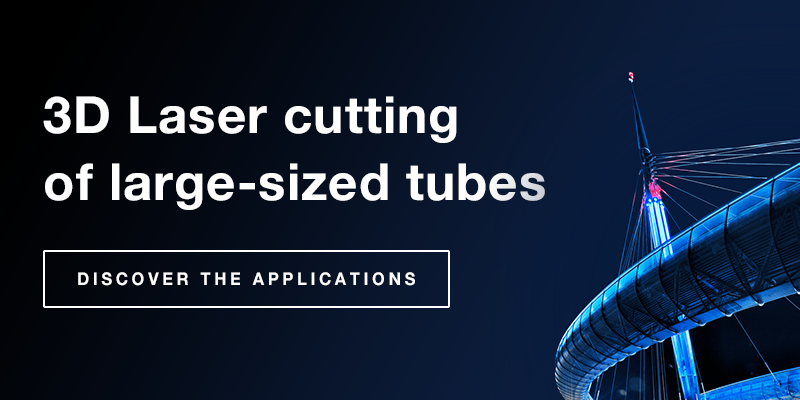Creating production batches is a key step of tube processing on the shop floor.
The jobs loaded on the machine must contain all the information needed to proceed, including machine movement instructions, geometric details of the part, material characterization and technological options.
According to production contingencies and the set workflow, batches can be created on the shop floor (directly on the machine) or in the office (and transferred to the machine).
Creating a new batch directly on the machine
This first scenario responds to the need to work directly on the shop floor, for instance, when you cannot plan orders in a structured manner through the technical department in response to an emergency and the part needs to be made right away.
It is precisely for this type of requirement that BLM GROUP cutting and bending machines are equipped with on-board software to allow easy programming on-site.
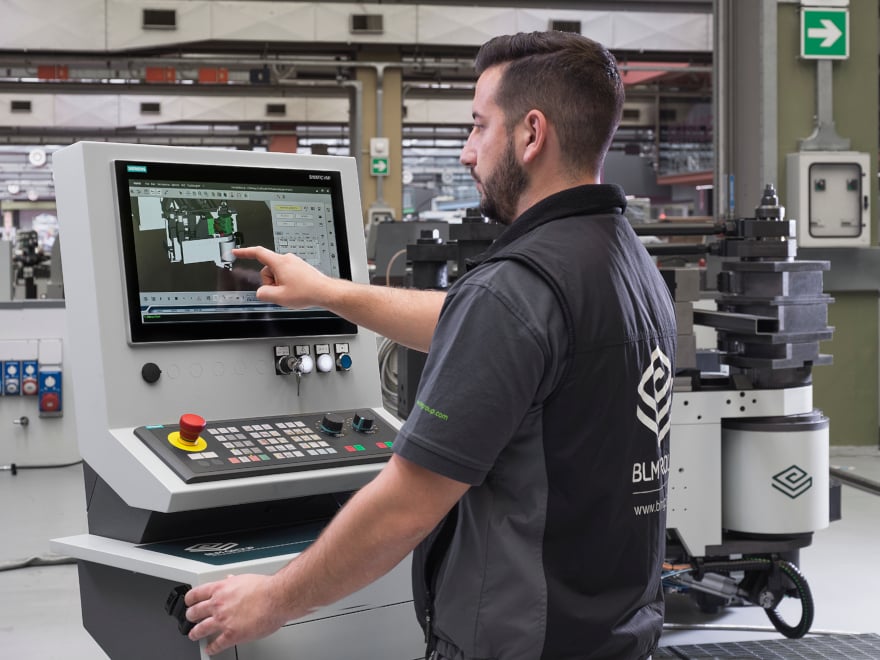 BLM GROUP bending systems allow the operator to program the new part even on-board the machine.
BLM GROUP bending systems allow the operator to program the new part even on-board the machine.
Creating production batches in the office
In this second scenario, production can be planned directly from the office, benefiting from the high-level job information that is usually not available to operators on the shop floor (such as change of priorities, material procurement, travel logistics and so forth).
The technical office can use the advanced functionalities of ProTube Enterprise, to prepare the cutting patterns (nesting), define the required material (length and/or codes), the technological processing options and plan the batch sequence.
Most of the technical options available on the computer numerical control (CNC) of the BLM GROUP cutting and bending machines are also accessible from the ProTube software. This makes it possible to prepare a batch with a high level of technical detail from the office, relieving the machine operator of all tasks.
Nesting for laser cutting jobs and optimal material utilization
Being able to fit the workpieces together so that they occupy all the space available on the tube is essential in laser cutting applications. Clearly, a more compact distribution of parts (nesting) means more profitability for the customer by saving time and raw material (and of course money, as a consequence).
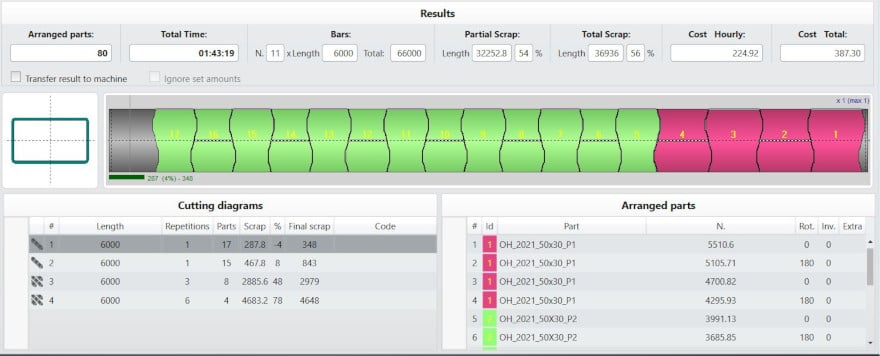 Representation of nesting with ProTube for a laser tube cutting system.
Representation of nesting with ProTube for a laser tube cutting system.
ProTube, the BLM GROUP software for batch preparation and production monitoring, has specific functions for nesting, including:
- automatic rotation strategies;
- compacting;
- calculation of the optimal bar length;
- anticipation of machine cycles for scrap reduction.
Read more about how to optimize material use in tube laser-cutting
A dedicated interface for your nesting project
The dedicated graphical user interface of ProTube can be used to manage your nesting project perfectly, displaying the cutting patterns, showing how many bars are needed for the job and how long it will take to finish.
If you have a limited number of tubes insufficient for the nesting operation, ProTube details the number of parts it can arrange along the tube by item type and the remaining quantity. This provides evidence of the current situation compared to the planned one in real time.
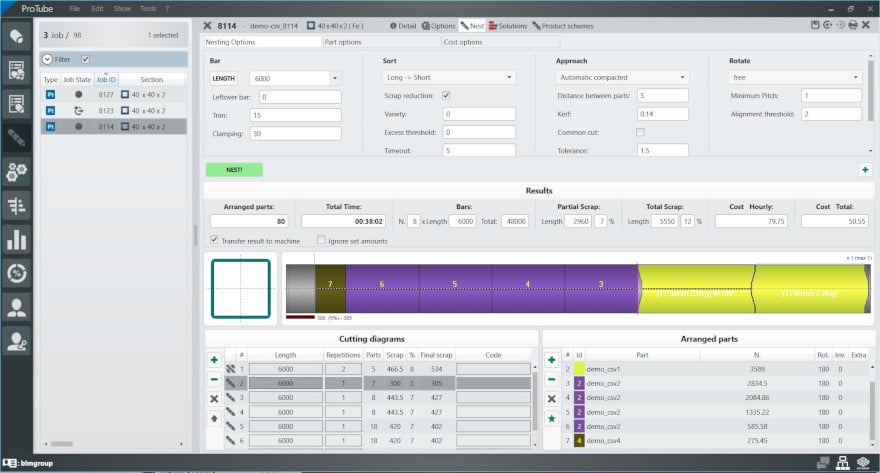 Nesting project on ProTube Enterprise.
Nesting project on ProTube Enterprise.
Estimating the time to complete a job is accurate and reliable, so the production manager can plan production activities correctly and avoid wasting time.
With ProTube, you can also define the technical options of the job that the operator will work on the machine with, from the office. This allows you to optimize your processes, saving time and energy.
Nesting strategies to manage welding and achieve the maximum quality of finished products
In some applications, such as furniture, window frames or metal finishes, the visual quality of the finished products is more important than saving the number of the bars to be processed. In such cases, the weld seam of the pipe may be a defect that must be avoided, for instance by ensuring that it is placed on the non-visible side of the part.
The BLM GROUP software suite meets these requirements by allowing you to position the weld seam already in the CAD/CAM design using the ArTube and VGP3D software and to perform weld-seam-oriented nesting in ProTube, ensuring a distribution of the parts on the bars that keeps the weld seam in the same position.
The BLM GROUP Lasertube machines have a special Active Weld option, to recognize the position of the weld seam on the bars and consequently cut the items with the appropriately aligned geometries.
.
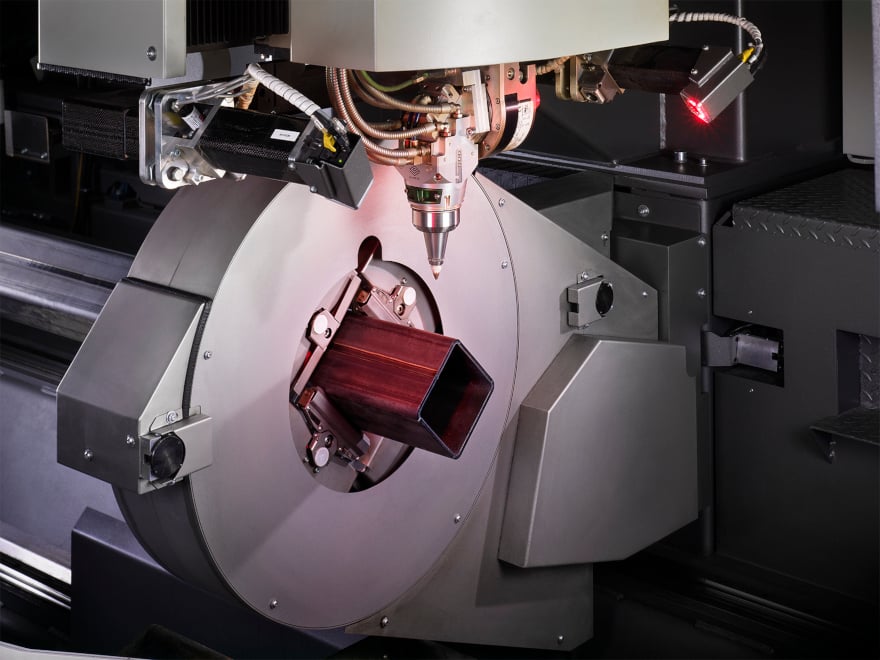 The image shows the Active Weld search system in action on the LT8.20.
The image shows the Active Weld search system in action on the LT8.20.
Material traceability in nesting
On the shop floor, it is important to handle the material correctly and to set up production with the correct tubes. Contractors are well aware that customers require processing on their specific set of tubes because they know the supplier and can rely on the raw material quality. The problem then arises of identifying and exactly tracking the specific batch of tubes needed for the job.
To respond to these requirements, ProTube allows you to enter the tube identification codes for a given batch and then prepare a nesting for a specific material set either directly on the graphical interface or from the ERP or the warehouse management software.
The parts produced will contain the material identification from which they have been processed as well as any end-of-tube lengths that are long enough to be returned to stock and then reused at a later date.
This ensures the traceability of the entire process, from nesting to production.
Conclusions
By capitalizing on the experience of the group in tube management, BLM GROUP software products have all the technological features needed to define the nesting project, optimally adapting to the most diverse production situations.


